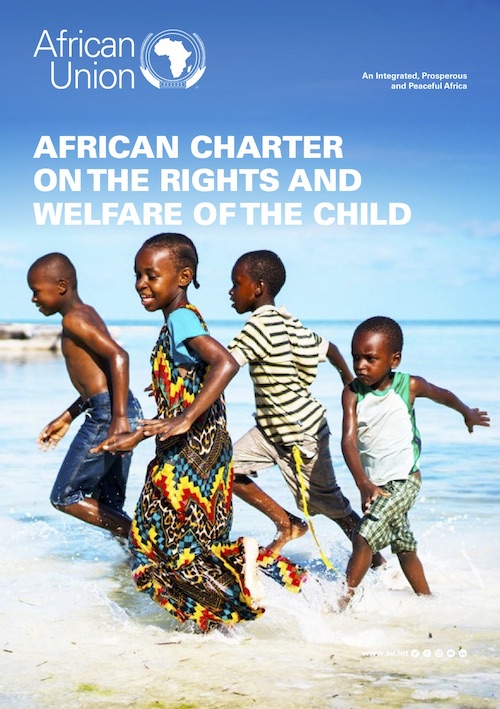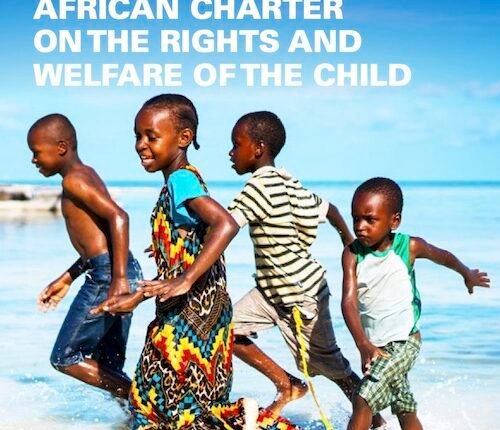The Child Rights Charter, also known as the United Nations Convention on the Rights of the Child (UNCRC), is a legally-binding international agreement that outlines the rights of every child, regardless of their race, religion, or abilities, including their civil, political, economic, social, and cultural rights. It ensures that children have the right to share and express their thoughts, feelings, and learning in any form as long as it does not harm others.
The UNCRC also calls for the protection of children from various forms of exploitation, abuse, and harm, and emphasizes the importance of education, family life, play, recreation, and an adequate standard of living for children.

Credit: au.int
Understanding Child Rights Charter
A Child Rights Charter is an essential framework that protects and promotes the rights of children. It is based on the United Nations Convention on the Rights of the Child (UNCRC), which is a legally-binding international agreement. The UNCRC outlines the civil, political, economic, social, and cultural rights of every child, regardless of their race, religion, or abilities. Children have the right to freely express their thoughts, feelings, and ideas through various mediums such as talking, drawing, or writing, as long as it doesn’t harm others.
In order to fulfill their promise of protecting and fulfilling the rights of children, countries adopt the UNCRC as an international legal framework. The charter includes provisions for education, stating that primary education should be compulsory, available, and free for all children. The CRC also calls for the protection of children from various forms of exploitation, torture, and capital punishment.
Children have the right to access healthcare, education, family life, play, recreation, and an adequate standard of living. They should also be protected from abuse and harm. Upholding and protecting these rights require collective efforts from governments, organizations, and communities to ensure the well-being and development of children.
Historical Context Of Child Rights Charter
The Child Rights Charter, also known as the United Nations Convention on the Rights of the Child (UNCRC), is a legally-binding international agreement that aims to protect and uphold the rights of every child. Regardless of their race, religion, or abilities, children are entitled to civil, political, economic, social, and cultural rights.
The origins of the Child Rights Charter can be traced back to the Declaration of the Rights of the Child, which called for the protection of children from various forms of exploitation and harm. Over time, the charter has evolved to include additional rights and responsibilities for children.
It emphasizes the importance of education, making primary education compulsory and accessible to all children. The charter also addresses the need to protect children from abuse and ensure their overall well-being. By ratifying the UNCRC, countries commit to safeguarding and fulfilling the rights of every child.
Key Principles Of Child Rights Charter
Child rights are based on the principle of non-discrimination and equality. The United Nations Convention on the Rights of the Child (UNCRC) ensures that every child, regardless of their race, religion, or abilities, is entitled to the same rights and opportunities. It promotes equal treatment and prohibits any form of discrimination against children.
The best interests of the child is a fundamental principle of the UNCRC. It emphasizes that in all actions concerning children, their best interests should be a primary consideration. This principle aims to ensure that decisions and actions taken by individuals or authorities take into account the well-being and development of the child.
Every child has the right to survival and development. This means that governments and society have a responsibility to provide children with access to the necessary resources, services, and opportunities to ensure their survival, growth, and overall development.
The UNCRC recognizes the child’s right to participate in decisions affecting them and to freely express their views, opinions, and feelings. It encourages child participation in family, community, and societal matters, supporting their sense of agency and promoting their active involvement in shaping their own lives.
International Conventions On Child Rights Charter
| International Conventions on Child Rights Charter: |
| – United Nations Convention on the Rights of the Child (UNCRC) |
| – African Charter on the Rights and Welfare of the Child (ACRWC) |
| – Convention on the Rights of Persons with Disabilities (CRPD) |
The United Nations Convention on the Rights of the Child (UNCRC) is an internationally binding agreement that outlines the rights of every child, regardless of their race, religion, or abilities. It covers civil, political, economic, social, and cultural rights. The convention emphasizes the importance of children having the right to freely express their thoughts and feelings through various means, such as talking, drawing, or writing, as long as it does not harm others.
The African Charter on the Rights and Welfare of the Child (ACRWC) focuses specifically on the rights and well-being of children in Africa. It aims to ensure that children have access to health, education, family life, recreation, and an adequate standard of living, while also protecting them from abuse and harm.
The Convention on the Rights of Persons with Disabilities (CRPD) recognizes the unique rights and needs of children with disabilities. It seeks to promote their full inclusion and participation in society, ensuring that they have access to education, healthcare, and support services.
Implementation Of Child Rights Charter
The implementation of the Child Rights Charter requires the active involvement of governments and policymakers. They play a crucial role in creating and enforcing laws and policies that protect and promote the rights of children. Governments need to allocate sufficient resources to ensure the effective implementation of these laws and policies and to provide necessary services and support to children.
Civil society organizations also play a significant role in advocating for child rights and holding governments accountable. They provide expertise, resources, and support to ensure that children’s rights are protected and respected. Civil society organizations work closely with governments, policymakers, and other stakeholders to create awareness, implement programs, and address child rights issues.
Monitoring and reporting mechanisms are essential to ensure that the Child Rights Charter is effectively implemented. Governments, civil society organizations, and other stakeholders need to regularly monitor the situation of children, collect data, and assess the impact of policies and programs. Reporting mechanisms, such as periodic reviews and reporting to international organizations, help to identify gaps and challenges in the implementation of child rights and facilitate the sharing of best practices.
Challenges And Violations Of Child Rights Charter
The Child Rights Charter aims to protect the rights of every child, regardless of their background or abilities. These rights include access to education, health care, family life, and protection from abuse and harm. However, challenges and violations of the Child Rights Charter still persist, necessitating ongoing efforts to ensure the wellbeing and safety of children worldwide.
The Child Rights Charter faces numerous challenges and violations, including child poverty and inequality, child labor and exploitation, and limited access to education and healthcare. Child poverty and inequality prevent children from having equal opportunities and access to basic necessities for their well-being and development.
Child labor and exploitation deny children their right to a safe and nurturing environment, hindering their physical and emotional well-being. Lack of access to education and healthcare further exacerbates the violations of children’s rights, limiting their potential and jeopardizing their overall quality of life. These challenges must be addressed to ensure the protection and fulfillment of children’s rights, promoting a society that values and prioritizes the well-being and development of every child.
Impact Of Child Rights Charter On Society
The Child Rights Charter, known as the United Nations Convention on the Rights of the Child (UNCRC), plays a crucial role in society by ensuring the civil, political, economic, social, and cultural rights of every child. It guarantees their right to education, health, family life, and protection from abuse and harm, regardless of their race, religion, or abilities.
Child Rights Charter The Impact of Child Rights Charter on Society Positive outcomes for children – The Child Rights Charter plays a crucial role in achieving sustainable development goals. It ensures that children’s rights are protected and fulfilled, regardless of their race, religion, or abilities.
The Charter recognizes and promotes the right of children to share their thoughts, feelings, and ideas freely, fostering their personal and social development. – It advocates for primary education to be compulsory, available, and free for all children, encouraging the development of diverse learning opportunities.
The Charter also calls for the protection of children from exploitation, abuse, and harm, emphasizing their right to health, family life, play, and recreation. – By implementing the principles outlined in the Child Rights Charter, societies can safeguard children’s well-being and provide them with an adequate standard of living. –
It is essential for individuals, communities, and governments to actively protect and advocate for child rights, ensuring a safe and nurturing environment for all children to thrive. Please add relevant anchor tags to make the paragraph more readable.
Frequently Asked Questions On Child Rights Charter
What Are The 5 Most Important Children’s Rights?
The 5 most important children’s rights include the right to health, education, family life, play and recreation, and protection from abuse and harm.
What Are The Key Principles Of The Child Rights Charter?
The key principles of the Child Rights Charter include non-discrimination, the best interests of the child, the right to life, survival, and development, and respect for the views of the child.
Why Is The Uncrc Important For Children’s Rights?
The UNCRC is important for children’s rights because it is a legally-binding agreement that sets out the rights of every child, regardless of their race, religion, or abilities. It helps protect children from exploitation, abuse, and discrimination.
How Does The Child Rights Charter Protect Children’s Education?
The Child Rights Charter ensures that children have the right to education. It promotes the development of different educational opportunities and makes primary education compulsory, available, and free for all children.
What Rights Do Children Have Under The Child Rights Charter?
Children have various rights under the Child Rights Charter, including the right to health, education, family life, play and recreation, an adequate standard of living, and protection from abuse and harm.
What Can We Do To Protect Child Rights?
To protect child rights, we can raise awareness about children’s rights, support organizations that work towards protecting child rights, advocate for policy changes, and report any violation of child rights to relevant authorities.
Conclusion
To ensure the well-being and protection of children, the United Nations Convention on the Rights of the Child (UNCRC) plays a vital role. This legally-binding international agreement guarantees the civil, political, economic, social, and cultural rights of every child, irrespective of their race, religion, or abilities.
It empowers children to freely express their thoughts, feelings, and knowledge without causing harm to others. By adopting this convention, nations have made a promise to safeguard and fulfill these rights. It is crucial to protect children from exploitation, abuse, and harm, while promoting their access to education, healthcare, family life, and equal opportunities.
Upholding child rights is fundamental in creating a better world for future generations.
Rights News Time : Unveiling The Truth- Human Rights Violations


